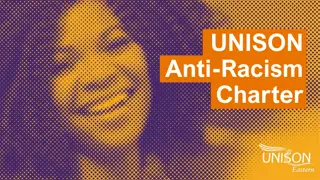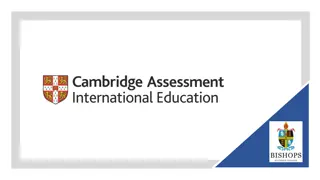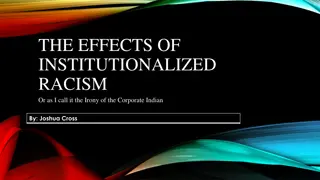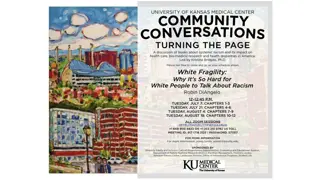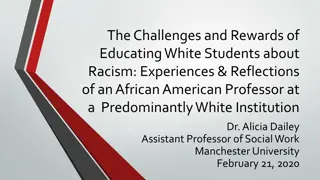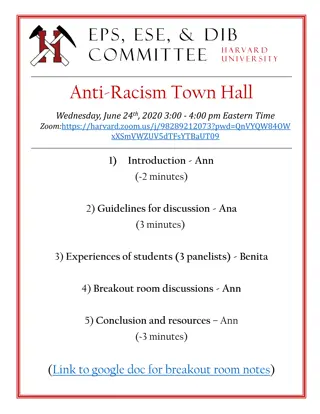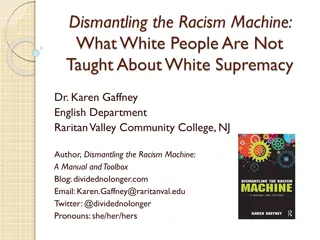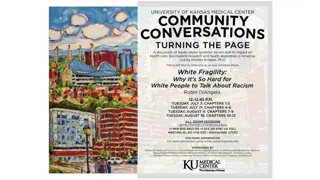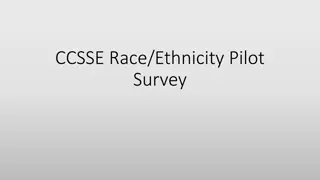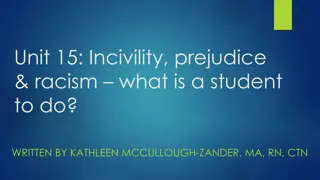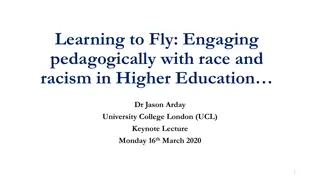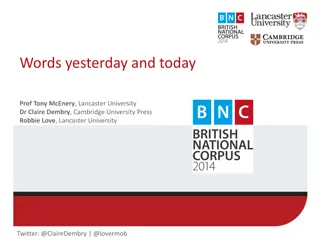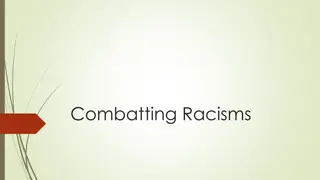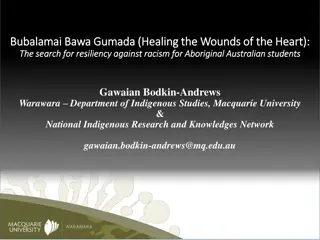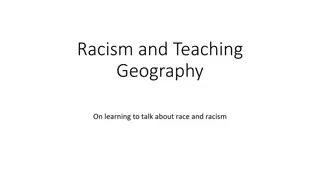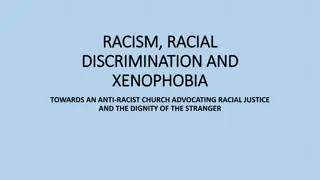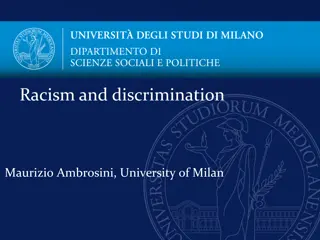Understanding Everyday Racism in Higher Education at Cambridge University
Launched in October 2018, the Everyday Racism project at Cambridge University aims to generate knowledge and inform antiracist activism by documenting experiences of racism. Utilizing technology developed by The Whistle, the project allows members and alumni to anonymously report incidents of racism, focusing on the experiences of students. The project emphasizes academic and activist goals, providing a platform for individuals to share their stories and seek support while working towards institutional change.
Download Presentation

Please find below an Image/Link to download the presentation.
The content on the website is provided AS IS for your information and personal use only. It may not be sold, licensed, or shared on other websites without obtaining consent from the author. Download presentation by click this link. If you encounter any issues during the download, it is possible that the publisher has removed the file from their server.
E N D
Presentation Transcript
Launched in October 2018 Aims to: generate knowledge about how everyday racism works in higher education. inform the work of student and staff antiracist activism pushing the agenda for institutional change. The primary goal is for individuals to be able to thoroughly document the complexity of experiencing and witnessing racism. The reports gathered through EER will help us understand how racism is experienced at Cambridge with numeric, descriptive, and geographic evidence. It can be used to inform advocacy, institutional change, and for academic presentations and publications. Creating solidarity through recognising and validating those who have experienced or witnessed racial abuse The project aims to raise a collective case against racism so that it is clear for students and staff the specific ways in which racism limits and challenges their life at the University. The Project The Project 2
Project Goals Project Goals The End Everyday Racism project in Cambridge has both academic and activist goals, as well as a strong commitment to recognising and validating those who have experienced racial abuse.
EER works on technology developed by The Whistle, an academic start-up supporting the collection and analysis of digital evidence for accountability and social change. Members and alumni of the University of Cambridge can document incidents of racism that they have either experienced or witnessed by filling in an anonymous form with qualitative and quantitative data. EER is a digital EER is a digital reporting platform reporting platform that gathers that gathers anonymous anonymous accounts of racism accounts of racism from members of from members of the Cambridge the Cambridge community community Participants are asked to report on where the incident of racism occurred, how it developed and unique to this project emotional and physical consequences. Participants verify their university membership through the use of an @cam or @cantab email address, data that is checked and then deleted. At the end of the process, participants can download their individual record, which may be of use should they choose to raise the incident through official reporting procedures. Participants are also directed to resources and organisations at the University for further support. 4
EVERYDAY EVERYDAY RACISM IN RACISM IN NUMBERS NUMBERS 5
Reporters' Status (n=78) Reporters' Status (n=78) 1% 1%1% 1% Students are the most Students are the most vulnerable population to vulnerable population to racialisation racialisation 10% 10% Of the reports submitted by members of the University, students are the most vulnerable population to racialisation in Cambridge undergraduate and graduate students, equally. 87% 87% Student Student Alumni Alumni Academic staff Academic staff Non-academic staff Non-academic staff
Likely due to COVID Likely due to COVID- -19, 40% of respondents are 40% of respondents are those who identify as those who identify as Asian Asian 19, Ethnicity of respondents reporting on own Ethnicity of respondents reporting on own behalf (n=68) behalf (n=68) Arab or Middle Eastern 4% Overall, those who identify as Asian have been the predominant group in being racialised, at 40 percent, followed by Black people at 28 percent. The current pandemic is having a significant impact on the racialisation of Asian people. This is reflected in the fact that half of incidents submitted by those who identify as Asian have been reported since February 2020. Mixed 19% Black or mixed Black 28% Asian or mixed Asian 40% 0% 5% 10% 15% 20% 25% 30% 35% 40% 45% 7
53 percent of racist incidents have taken place in Colleges including, but not limited to, student accommodation, offices, porters lodges, gardens and supervision rooms. Various university buildings and grounds were the setting for 23 percent of racist incidents. More than half of all More than half of all racist incidents have racist incidents have been in Colleges been in Colleges (n=108) (n=108) Location of incident (n=108) Location of incident (n=108) College 52.8% Department 16.7% In the street/commuting 11.1% Club/caf /restaurant 5.6% Grounds within a university site 2.8% Library, museum 1.9% Administrative offices 1.9% Home 0.9% 8
TYPE OF PERPETRATORS (N=84) Perpetrators of Perpetrators of racism range across racism range across roles at the roles at the university (n=84) university (n=84) 25% 25% In the incidents that have been reported, responses have shown that academic staff and students have equally been perpetrators, at 25% each. This is followed by administrative staff and porters involvement. However, the narrative data clearly shows that porters impact on racialisation at the University of Cambridge is significant. 12% 12% ACADEMIC STAFF ADMIN STAFF PORTER STUDENT 9
Racist incidents impact respondents work and studies Racist incidents impact respondents work and studies More than 1 in 4 people who have reported a racist incident feel that their job or study is, or is potentially, at risk as a result of the incident. One-third of reporters have stated that the incident might have made or did make it difficult for them to perform well in their work or studies. Job/study made more difficult (n=73) Job/study made more difficult (n=73) Job/study feels at risk (n=71) Job/study feels at risk (n=71) 13% 23% 13% 62% 15% 75% Yes Not sure No Yes Not sure No 10
Almost 50% Almost 50% experienced hostility experienced hostility directed towards them directed towards them followed by contempt followed by contempt and rejection and rejection In detailing their experience of everyday racism, almost half the respondents reported feeling that hostility was directed towards them, while a third of reporters felt themselves to be the object of contempt and/or rejection. 11
More than 50% of More than 50% of respondents felt anger respondents felt anger followed by indignation, followed by indignation, incredulity, humiliation, incredulity, humiliation, embarrassment and embarrassment and confusion confusion Eighty-three respondents documented feeling a total of 373 emotions during the racist incidents they reported. More than half of them reported feeling angry. Indignation, incredulity, humiliation, embarrassment and confusion were experienced by more than 40 percent of the respondents. 12
The vast majority of The vast majority of respondents felt respondents felt physical reactions physical reactions like nervousness and like nervousness and bodily tension bodily tension Feelings of nervousness and bodily tension have been experienced by more than 70 percent of respondents as a result of the racist incident. 13
Key consequences of racism Key consequences of racism are feelings of not belonging are feelings of not belonging in Cambridge, discomfort and in Cambridge, discomfort and anger anger in Cambridge Sixty percent of respondents reported a feeling of not belonging in Cambridge as a consequence of the racist incident they experienced. Almost half of reporters felt discomfort and/or anger following the incident. in College 14
KEY KEY CONCLUSIONS CONCLUSIONS 15
Key Conclusions Need for validation of feelings and experiences Experiencing powerlessness o feeling like one cannot officially report the incident, o feeling powerless when one does file a complaint, o the status hierarchy between the perpetrator and perpetrated that exacerbates the situation. Feeling excluded from physical spaces o Participants reported 40 incidents where they were either refused entry to a physical space, were discriminated against as they were entering a space, or did not feel safe about returning to the space where the incident occurred. o Being portered Revealing ingrained racism 16
I am happy that for once someone is addressing happy that for once someone is addressing this issue this issue in Cambridge as I felt it was swept under the carpet for too long. Feedback shows that Feedback shows that this reporting tool had this reporting tool had benefited the benefited the respondents respondents profoundly, as they profoundly, as they have felt like their have felt like their experiences are seen experiences are seen and validated. and validated. It s been great writing this down, definitely feels therapeutic therapeutic in a way. I would say that using our experiences as testimonials to convince the university to establish strict practices would be very useful. EER has made it EER has made it possible for those who possible for those who have experienced and have experienced and witnessed racism been witnessed racism been designed to feel designed to feel solidarity by going solidarity by going through this process. through this process. This is great and I feel like a weight has been lifted thank you so much! a weight has been lifted, I would just like to say this is a great initiative Cambridge really has no excuse for not having done this before. great initiative, and 17
ACTION ACTION POINTS POINTS 18
Action Points Racist incidents create an overwhelming range of physical and emotional reactions for those who experience them, making it difficult to process and move on. This should be taken into account in all actions taken. Staff and students should be made feel safe and empowered to report racist incidents Increase confidence in reporting mechanisms The University and Colleges should make their anti-racist position clearer and reporting easier. They should take immediate action when a complaint is filed. This will also interrupt the shifting of responsibility. University-wide anti-racism training, for students and staff is necessary Colleges should assume further responsibility for taking action against racism, and porters should receive further training on non-discriminatory practices The University can create an inter-collegiate system or charter to support Colleges and hold them to account for such training. Colleges should actively work towards advancing their own zero-tolerance policy on racism, and develop and support in-college anti-racist groups. The University should make its anti-racist stance visible in the city of Cambridge Departments and colleges could help to increase awareness of the EER platform. 19


